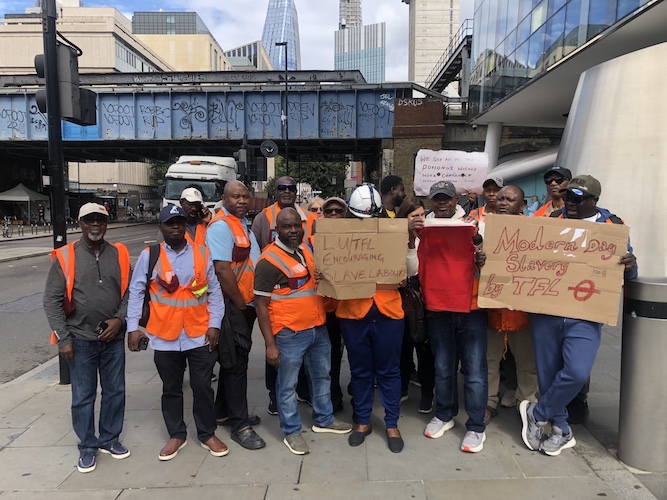It is easy to take for granted the scale and complexity of keeping the London Underground working, providing up to four million passenger journeys a day. And it is easy to forget, perhaps especially so with strikes by some Tube workers on the near horizon, that many people essential to keeping the network running are little known of and rarely seen.
I encountered some of those, entirely by chance, during a visit to Blackfriars the other day. Emerging from Southwark station, I spotted them across the road outside the Palestra building, where Transport for London has office space – a group of maybe 20, most (but not all) of them men, most wearing hi-vis jackets, some carrying placards, and all of them with armbands bearing the initials PWT.
That stands for Protecting Workers on the Track. Essentially, PWT personnel on the London Underground are responsible for the safety of others working on or around Tube rails, be that supervising the movement of trains or having full control or “possession” of a designated section of track. “If one of us is not there, people doing maintenance or whatever it is, cannot do their job,” is how one of those outside Palestra put it.
What is their beef with TfL? They aren’t TfL employees, but agency-supplied. TfL has recently entered into the latest of a number of contracts with Morson, a large recruitment firm that bills itself as the UK leader for placing people in transport and rail jobs.
The PWT demonstrators claimed that this new deal, due to come into effect from Monday, will weaken their job security and have the effect of reducing their incomes. Morson disputes this, saying in a statement that “terms have not been reduced” and that payment rates “remain on a like-for-like basis with the previous contract” at levels “well above the London Living Wage”.
The detail is complex, but in an email to Sir Sadiq Khan, sent last Monday, Ibrahim Shittu, writing on behalf of “protection services personnel” who work for Network Rail within London and TfL subsidiaries as well as on the Tube, says that a move to a form of PAYE taxation system will entail a reduction in net income and, at the same time, no enhanced employment rights or security. “Workers will still face a disguised form of zero-hour contracting, with no guaranteed shifts,” the letter says.
Agency work, of course, is often less reliably available than permanent employment, but also allows a flexibility appreciated by some. However, the PWT protesters feel that their positions have been made unacceptably more precarious.
Usually, they work at night, when track maintenance is routinely done. They describe not knowing if they are to be needed until four and five in the afternoon or even as late as eight in the evening, receiving the information by text. The unsocial hours and qualifications required mean, according to one I spoke to, that a five-shift week can yield an income of around £1,000 a week, which above the London median of around £850. But a two-shift week means only £400 or so.
In his letter, Shittu says that under the previous framework, PWT workers’ pay rates corresponded to their qualifications, so that those with higher level certificates were paid better accordingly, regardless of the specific tasks they were asked to perform, but that from now on, the highest qualified will only be paid the highest rates if the work undertaken requires that degree of expertise.
Moreover, he contends to the Mayor that workers will no longer be able to go to an alternative agency due to “Morson now monopolising the contract”. Previously, another agency also supplied this type of temporary staff. Shittu also points out, as did his colleagues outside Palestra, that some of them have been doing this work for more than 20 years.
A number of the roughly 200 PWT personnel in London are individually members of the RMT union – which has long called for their roles to be brought in-house – but it is not in a position to negotiate for them. The Mayor, who chairs the TfL board, has been asked to halt the contract.
Below is Morson’s statement in full:
“Terms have not been reduced; payment rates under the new PAYE model were developed in collaboration with our expert accountancy partners and umbrella company suppliers. These remain on a like-for-like basis with the previous contract. Workers continue to receive fair, transparent pay that is well above the London Living Wage, while their rights and job security remain unchanged. This PAYE model also brings track protection workers in line with other TfL contracts and other government bodies, ensuring consistency, compliance, and fairness across the board.
Morson Group takes pride in maintaining the highest standards of compliance and worker protection across all contracts. These principles remain at the heart of how we operate and reflect our ongoing commitment to the workforce who are essential to the capital’s transport infrastructure. Looking ahead, we will continue working with TfL and trade unions to safeguard fair standards and ensure the voices of our workforce remain central as we support London’s future transport needs.”
I’ve asked for more detail about some specific points and will update when this arrives. TfL said:
” We encourage Morson to continue engaging with their workforce on the concerns raised.”
It will be interesting to see what happens next.
OnLondon.co.uk provides unique coverage of the capital’s politics, development and culture with no paywall and no ads. Nearly all its income comes from individual supporters. For £5 a month or £50 a year they receive in-depth newsletters and London event offers. Pay via any Donate link on the website or by becoming a paying subscriber to publisher and editor Dave Hill’s Substack.

